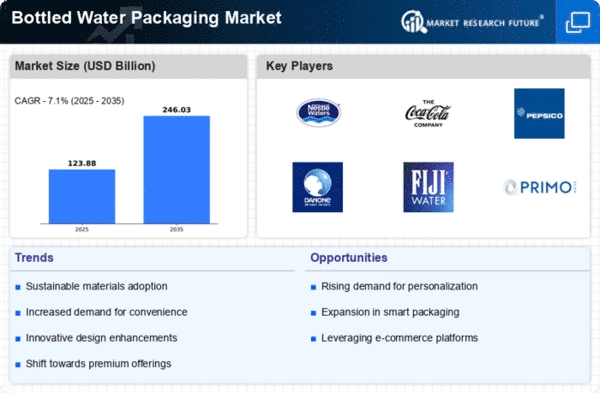Top Industry Leaders in the Bottled Water Packaging Market
 The bottled water packaging market, brimming with billions of bottles annually, is a surprisingly dynamic battleground. fueled by factors like rising health consciousness, convenience demands, and sustainability concerns. This liquid battlefield sees established giants like Nestlé and Coca-Cola clashing with nimble regional players and innovative startups, all vying for a larger sip of the market share.
The bottled water packaging market, brimming with billions of bottles annually, is a surprisingly dynamic battleground. fueled by factors like rising health consciousness, convenience demands, and sustainability concerns. This liquid battlefield sees established giants like Nestlé and Coca-Cola clashing with nimble regional players and innovative startups, all vying for a larger sip of the market share.
Strategies Adopted by Key Players:
-
Product Diversification: Offering a range of water types (spring, sparkling, flavored) and bottle sizes caters to diverse consumer preferences. PepsiCo's Aquafina and Nestlé's Pure Life lines exemplify this approach. -
Embracing Innovation: R&D leads to cutting-edge solutions. Amcor's development of lightweight, eco-friendly bottles and Sidel International's self-cleaning bottle technologies showcase this focus on innovation. -
Strategic Partnerships and Acquisitions: Collaborations with material suppliers and technology providers accelerate development and expand reach. Coca-Cola's partnership with Eastman Chemical Company for plant-based bottle materials and Nestlé's acquisition of BlueTriton Brands exemplify this strategy. -
Focus on Sustainability: Eco-friendly materials, production processes, and recycling programs resonate with environmentally conscious consumers. Danone's use of recycled PET and PepsiCo's focus on renewable energy in production showcase this trend. -
Brand Building and Marketing: Strong brand image and targeted marketing campaigns are crucial in a crowded market. Coca-Cola's global brand recognition and PepsiCo's focus on celebrity endorsements exemplify this approach.
Factors Influencing Market Share:
-
Technological Advancements: Advancements in materials like bioplastics and filtration technologies, along with innovations in bottle design and functionality, create new market opportunities. Companies offering cutting-edge solutions gain an edge. -
Regulatory Landscape: Evolving regulations around plastic waste and water quality impact packaging materials and production processes. Adapting to these regulations swiftly is crucial for success. -
Cost-Effectiveness and Efficiency: Balancing affordability with high quality and operational efficiency remains a primary concern. Companies employing lean manufacturing processes and leveraging economies of scale gain an advantage. -
Regional Growth and Demand: The rise of disposable incomes and busy lifestyles in emerging markets like India and China drives demand for bottled water. Companies with strong regional presence and distribution networks gain an advantage. -
Consumer Preferences and Health Trends: The growing preference for healthier options like sparkling water and flavored water with reduced sugar content influences market dynamics. Companies catering to these trends stand out.
Key Companies in the Bottled Water Packaging market include
Amcor Ltd. (Australia)
SKS Bottle & Packaging Inc. (U.S.)
Greif Inc. (U.S.)
Silgan Holdings (U.S.)
ExoPackaging (India)
American Pacific Corporation (U.S.)
Berry , Inc. (U.S.)
CKS Packaging (U.S.)
Sidel Group (Italy)
Kaufman Container (U S.) Among others
Recent Developments:
June 2023: In Andhra Pradesh, Coca-Cola India has partnered with ALPLA to launch a fresh bottle made entirely of recycled PET (rPET). This is a significant development because it is the first time that an Indian food or beverage container has been made by this method. ALPLA expects that its efforts will enable Coca-Cola’s target of using no less than fifty percent recycled material in all packaging by 2030 and, therefore, provide the rPET preforms. The new rPET bottle came in one-liter bottles and was launched by the packaged drinking water company Kinley.
For instance, in September 2022, Waterloo Sparkling Water released two new flavors called "Sweater Weather": pumpkin spice and caramel apple. They wanted these additions to represent the fall season as well as some of its most popular tastes.
October 2022- Sidel unveiled its 1SKIN bottle, which they believe is the future of sustainable packaging for sensitive beverages. A label-less, unique, recyclable PET bottle has been created by them. This product was intended to help Sidel's customers reach their sustainability goals while driving sales of premium products through great shelf appeal coupled with strong eco credentials.
In May 2020, Kopparberg Brewery launched bottled water in the United Kingdom that claims to be vegan-friendly and gluten-free, with a 5% ABV level. It is sold in European Morrisons and Tesco stores in flavours such as mixed berries, black cherry, and passion fruit.
In January 2020, Emerald Coast Ultra-Pure Water, a Florida-based company, has introduced 100% aluminium bottles for its ultra-purified product line. This innovative packaging is 100% recyclable and reusable, and it attempts to reduce plastic pollution. Packaging is offered in 16.0 oz or 473ml bottles with a tiny protective lining to prevent aluminium flavouring.
In June 2020, ZenWTR will release new packaging for bottles made of ocean-rescued plastic . The product is offered in 1 litre, 23.7 ounce, and 16.9 ounce sizes.
January 2022: Plastipak expands its PET recycling capacity at the manufacturing site in Bascharage, Luxembourg, where it manufactures and recycles plastic bottles/containers; it converts washed post-consumer rPET flakes into food-grade rPET pellets










